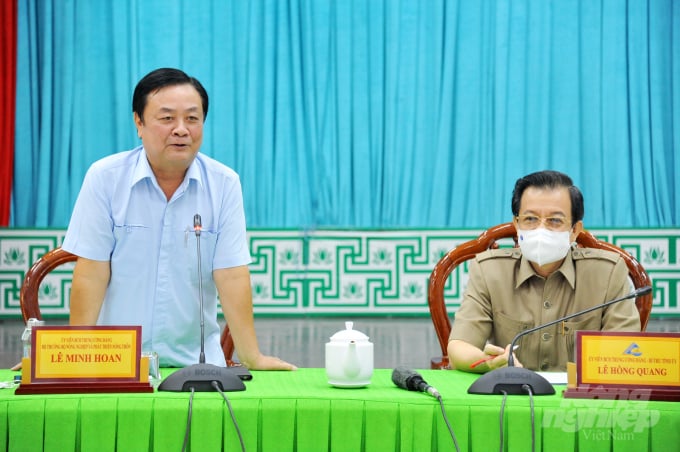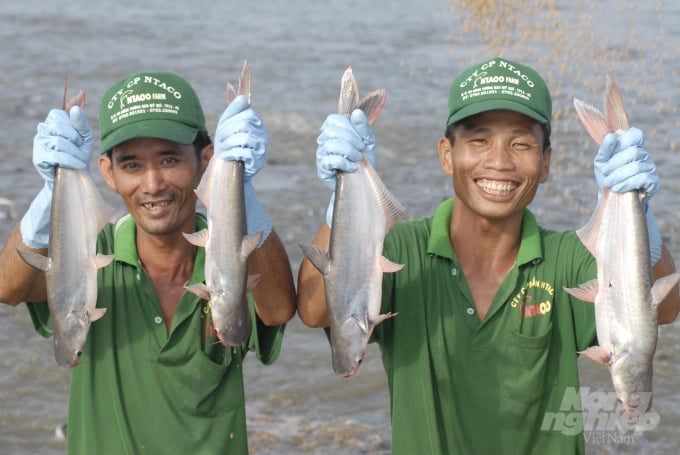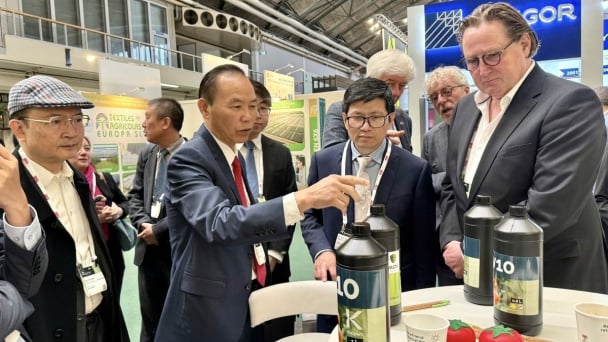June 14, 2025 | 13:19 GMT +7
June 14, 2025 | 13:19 GMT +7
Hotline: 0913.378.918
June 14, 2025 | 13:19 GMT +7
Hotline: 0913.378.918

Minister of Agriculture and Rural Development Le Minh Hoan addresses at the meeting with An Giang People's Committee on June 28. Photo: Le Hoang Vu.
The southern province of An Giang has been implementing measures to attract investments in agriculture. Besides administrative reforms, the province called on investment in large-sized agriculture projects or those with hi-tech applications.
Until now, out of 231 registered projects in the province, 60 projects are in agriculture with a total investment of VND 22.86 trillion.
Vice-Chairman of the provincial People's Committee Tran Anh Thu said in the 2016-2020 period, An Giang focused on synchronously implementing many major programmes and projects such as restructuring the agricultural sector and shifting the crop structure from rice to vegetables and fruit trees, and developing the fisheries sector sustainably.
In the period, the sector’s growth rate was averaged at 2.86 per cent, the average agricultural production value reached VND 192 million (US$8,316) per hectare in 2020, VND 72 million higher than that in 2015, and per capita income in rural areas hit VND49 million a year.
To make such achievements, the province’s agriculture experienced three major stages.
In the first stage starting in 1986, the province shifted from a province that lacked food to a rice production hub that provided rice for domestic use and export.
In the second stage, the province developed caged tra fish farming in 1990. Until now, it has about 2,400 ha of caged tra fish farms. Over 1,700 ha accounting for about 70 per cent of tra fish growing area in the province are under co-operation programmes between farmers and enterprises. An Giang tra fish is now exported to more than 100 countries across the world. Local farmers now can master advanced technologies in breeding and raising.
In the third stage, currently, local farmers could grow three rice seasons in an area of over 670,000 ha. The province earns more than US$250 million yearly from exporting rice.
Now, An Giang identified aquaculture production as a main pillar to develop its agriculture, vegetable and fruit are the next and then, the rice production.

An Giang Province identified aquaculture main pillar to develop its economy in coming time. Photo : Le Hoang Vu.
Vice-Chairman of the provincial People's Committee Tran Anh Thu asked the ministry to propose to the Government the establishment of a price stabilising fund for rice and tra fish – two of the national key agriculture products.
The province also asked for about VND 1 trillion to implement six projects tackling landslides and about VND 1.5 trillion to build safe residential areas for people who are living in landslide-prone areas.
Minister of Agriculture and Rural Development Le Minh Hoan said that during the past time, An Giang Province did a good job in making use of its strength in agriculture.
He said that responding to climate change’s impacts, market demand and consumers’ taste, it was necessary to give top priority to tra fish at this time, then vegetable, fruits and finally rice.
Hoan also applauded the province’s success in developing modern sustainable agriculture.
He emphasized the need to further engage farmers in sustainable agriculture.
Nguyen Duy Thuan, director-general of Loc Troi Group said that the group cooperated with farmers in the province’s Thoai Son District to grow unseasoned rice. The model helped reduced 15 per cent of investment and farmers could sell the rice at reasonable prices, avoid the situation in which bumper crop is accompanied with dropping prices.
If the model was applied to the whole 36,000 ha of rice in Thoai Son District, local farmers could earn at least VND 1 trillion per year.
Loc Troi Group also assisted farmers in rice production for exports to Europe. More than 1,300 agriculture staff of the group directly instructed farmers with proper farming technique. With dozens of plants, more than 30 partners and banks, the group could offer farmers co-operation opportunities towards sustainable rice production.

(VAN) The Department of Agriculture in South Africa has announced the country’s first mass vaccination of poultry to prevent local birds from contracting avian influenza.

(VAN) Establishment of the Mekong Delta Regional Agricultural Linkage Center, aiming for a closed value chain, deep processing, trading platforms, and international market connectivity.

(VAN) Gia Lai province has recently recorded 460 rare species of animals and plants, contributing to forest conservation and biodiversity planning in the region.

(VAN) Ms. Caroline Beresford, New Zealand Ambassador to Vietnam, expressed confidence that agricultural cooperation between Vietnam and New Zealand will develop sustainably, be climate-resilient, and promote gender equality.

(VAN) Vietnam reaffirms its commitment to international cooperation in fostering sustainable and responsible fisheries while ensuring resilient livelihoods for small-scale fishing communities.

(VAN) More than just a technical solution, science and technology are gradually becoming a cornerstone in Vietnam’s journey toward building a circular economy.

(VAN) The Netherlands is ready to accompany Vietnam in building a green, circular, and sustainable agriculture sector that is resilient to climate change.